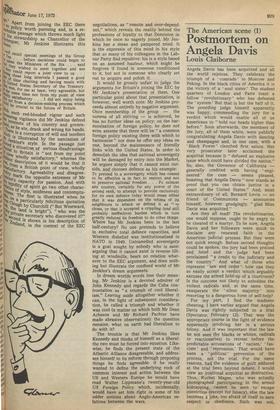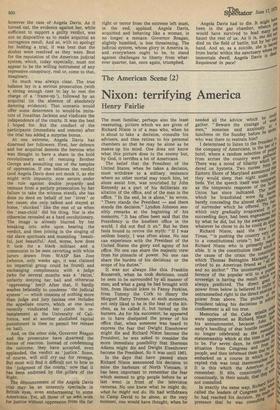The American scene (1)
Postmortem on Angela Davis
Louis Claiborne
Angela Davis has been acquitted and all the world rejoices. They celebrate the triumph of a ' comrade ' in Moscow and Peking. In the black cities of America it is the victory of a soul sister.' The student quarters of London and Paris toast a fellow 'revolutionary' who has defeated the system.' But that is but the half of it. The presiding judge himself apparently was happy, commending the jury for a verdict which would enable all of us Americans to "hold our heads higher than before." Soon afterwards, the members of the jury, all of them white, were publicly congratulating Angela Davis with dancing and champagne and, in one case, with a 'Black Power' clenched first salute. Her very prosecutor later acclaimed the acquittal because it "defused an explosive issue which could have divided the nation." So, also, the Governor of California — generally credited with having ' engineered ' the case — seems pleased, boasting that Angela Davis "now stands as proof that you can obtain justice in a court of the United States." And, most extraordinary of all, Bernard Levin — no friend of Communists — announces himself, however grudgingly, "glad Miss Davis was acquitted."
Are they all mad? The revolutionaries, one would suppose, ought to be angry to be cheated of a martyr. To be sure, Angela Davis and, her followers were quick to disclaim any renewed faith in the American judicial process. But they were not quick enough. Before second thoughts could be spoken, the jury had been praised and feted and the judge had been proclaimed "a credit to the judiciary and the country." And what of those who represent law and order ': how can they so easily accept a verdict which arguably excuses the armed hold-up of a courtroom? Is the outcome not likely to enbolden the violent radicals and, at the same time, exasperate the 'silent majority' into resorting to a dangerous form of self-help?
For my part, I find the madness cheering. I have earlier argued that Angela Davis was rightly subjected to a trial (Spectator, February 12). That was the appropriate course in the light of evidence apparently involving her in a serious felony. And it was important that the law be not seen (by blacks or whites, radicals or reactionaries) to retreat before the predictable accusations of racism,' 'fascism ' and repression.' That would have been a 'political' perversion of the process, not the trial. For the same reasons, had, the evidence of guilt adduced at the trial been beyond debate, I would view an irrational acquittal as destructive. Thus, Ruchel Magee, who was actually photographed participating in the armed kidnapping, cannot be seen to escape conviction (except for lunacy), else the law becomes a joke, too afraid of itself to earn respect or obedience. Such was not, however the case of Angela Davis. As it turned out, the evidence against her, while sufficient to support a guilty verdict, was not so dispositive as to make acquittal an outrageous result. And so, with no apology for holding a trial, it was best that the doubts were resolved as they were. Best for the reputation of the American judicial system, which, today especially, must not appear to be the willing instrument of any repressive conspiracy, real or, come to that, imaginary.
So much was always clear. The true balance lay in a serious prosecution (with a strong enough case to lay to rest the charge of a 'frame-up '), followed by an acquittal (in the absence of absolutely damning evidence). That scenario would offer some deterrence to would-be imitators of Jonathan Jackson and vindicate the independence of the courts. It was the best I hoped for. But the conduct of the participants (immediate and remote) after the trial has added a surprise bonus.
At one extreme, Angela Davis has disarmed her followers. First, her defence and her acquittal demote the heroine who was thought to have a share in the bold revolutionary act of rescuing Brother George and assaulting one of the temples of oppression. If one believes the verdict (and Angela Davis does not mock it, as she might with impunity, now secure under the rule against double jeopardy and immune from a perjury prosecution by her failure to take the witness stand), she has done no deed on behalf of her 'lover' or her cause; she only talked and stayed at home, ' shocked ' like the rest of us when the ' man-child ' did his thing. Nor is she otherwise revealed as a hard revolutionary. The image is already blurred by her breaking into sobs upon hearing the verdict, and then joining in the singing of old slave spirituals and mumbling beautiful, just beautiful.' And, worse, how does it look for a black militant and a communist to be seen cavorting with white jurors drawn from WASP San Jose (whence, only weeks ago, it was claimed no impartial group could be found) and exchanging compliments with a judge (who for several months was a ' racist,' unfairly denying her bail and otherwise ' oppressing ' her)? After that, it hardly washes belatedly to condemn the judicial system' — which consists of nothing more than judge and jury (unless one includes the appellate courts, which at one level recently vindicated her claim to reinstatement at the University of California, and at another abolished capital punishment in time to permit her release on bail).
And, on the other side, Governor Reagan and the prosecutor have disarmed the forces of reaction. Instead of condemning the outcome, they have accepted, even applauded, the verdict as justice.' Some, of course, will still cry out for revenge. But most will find it difficult not to bow to the 'judgment of the courts,' now that it has been endorsed by the pillars of the Right.
The denouncement of the Angela Davis trial may be an unseemly spectacle in British eyes, even embarrassing to some Americans. Yet, all those of us who wish for justice without oppression from the far right or terror from the extreme left must, in the end, applaud. Angela Davis, acquitted and behaving like a woman, is no longer a menace. Governor Reagan, slightly humbled, is less threatening. The judicial system, whose glory in America is, and everywhere ought to be, to stand against challenges to liberty from whatever quarter, has, once again, triumphed.











































 Previous page
Previous page